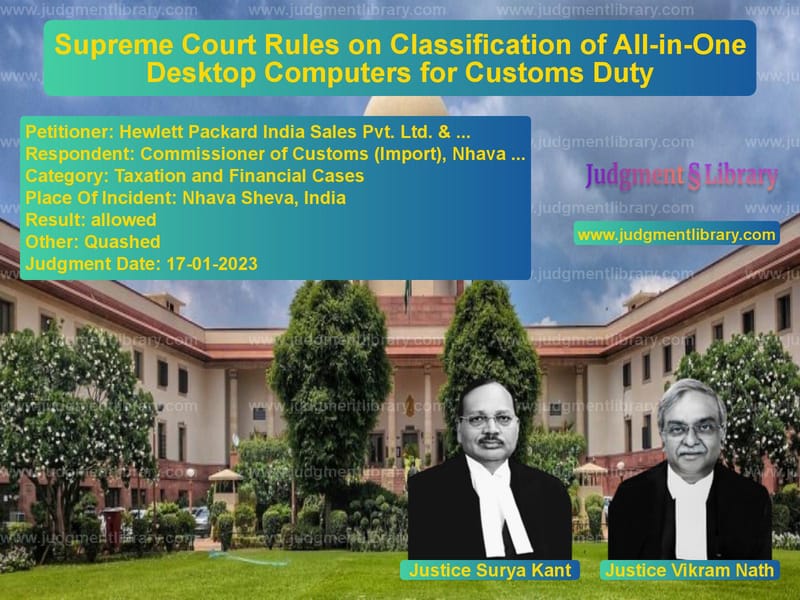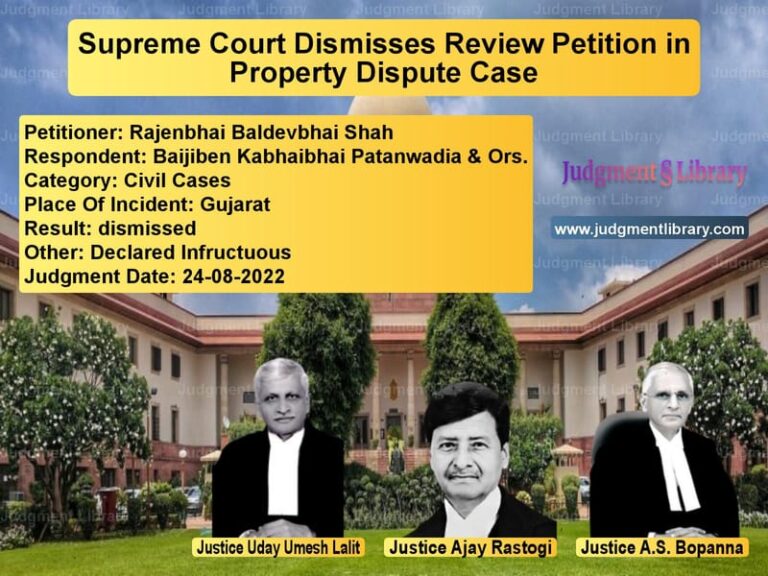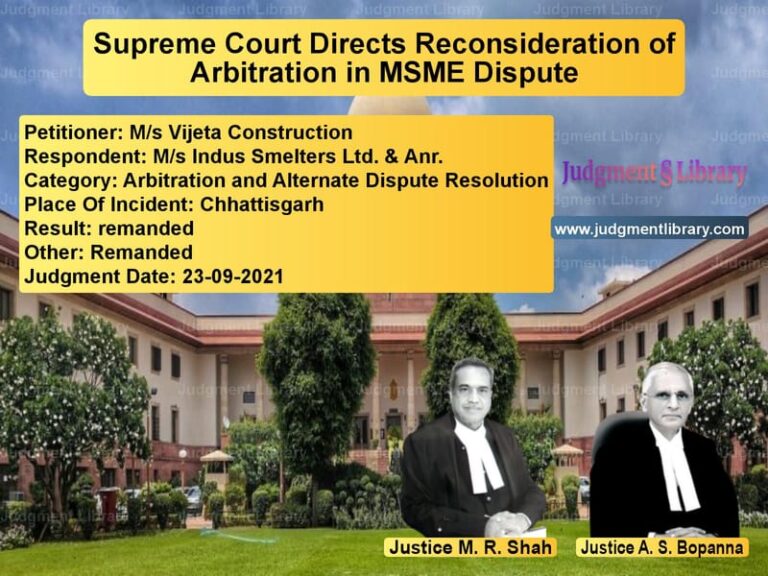Supreme Court Rules on Classification of All-in-One Desktop Computers for Customs Duty
The case of Hewlett Packard India Sales Pvt. Ltd. & Lenovo (India) Pvt. Ltd. v. Commissioner of Customs (Import), Nhava Sheva revolves around the classification of ‘All-in-One’ desktop computers under the Central Excise Tariff Act, 1985. The Supreme Court ruled in favor of the appellants, holding that the imported goods should be classified under Tariff Item 8471 50 00 instead of Tariff Item 8471 30 10, leading to a different method of computing customs duty.
Background of the Case
Hewlett Packard India Sales Pvt. Ltd. and Lenovo (India) Pvt. Ltd. imported units of ‘All-in-One Integrated Desktop Computers’ and classified them under Tariff Item 8471 50 00 in accordance with the self-assessment procedure. However, during examination, the Customs Authorities reclassified the goods under Tariff Item 8471 30 10. This classification was upheld by the Assistant Commissioner of Customs and the Commissioner of Customs (Appeal), and later affirmed by the Customs, Excise and Service Tax Appellate Tribunal (CESTAT), Mumbai.
The key issue in dispute was that while the rate of duty remained the same under both classifications, the method of valuation differed significantly. Goods under Tariff Item 8471 30 10 attracted the provisions of Section 4A of the Central Excise Act, 1944, which determined the excisable value based on the retail sale price. On the other hand, classification under Tariff Item 8471 50 00 required valuation based on the transaction price under Section 4 of the Central Excise Act, 1944. The latter method would have effectively reduced the overall customs duty liability, which led to the dispute.
Key Legal Issues
1. Whether the Imported ‘All-in-One’ Desktop Computers Qualify as ‘Portable’?
The core issue before the Supreme Court was whether the ‘All-in-One’ desktop computers imported by the appellants could be classified as ‘portable’ under Tariff Item 8471 30 10.
The respondents argued that:
- The goods weighed less than 10 kilograms, making them portable.
- The computers had a touch screen display, functioning as both an input and output unit.
- Portability was not affected by the absence of an in-built power source.
However, the appellants contended:
- That ‘All-in-One’ desktops were not designed for mobility and had dimensions making them unsuitable for daily transit.
- That the term ‘portable’ should be interpreted in the context of Automatic Data Processing (ADP) Machines, rather than its general dictionary meaning.
- The classification should be in line with global standards, including the World Customs Organization’s Harmonized System Explanatory Notes, which do not classify such computers as portable.
2. The Impact of Technological Advancements on Classification
The appellants further argued that technological progress had significantly altered the characteristics of computing devices, and that the classification criteria needed to evolve accordingly. The Supreme Court recognized this factor and observed:
“Scientific progress has greatly reduced the weight associated with high-performance computing. The advent of LED technology, faster microchips, and compact designs has transformed the concept of portability.”
3. Burden of Proof in Customs Classification
The Court emphasized that the burden of proving a different classification was on the Customs Authorities. The Court held:
“When the Customs Department seeks to classify a product under a different category than that declared by the importer, the burden of proof lies on the department to justify the reclassification.”
Supreme Court’s Judgment
The Supreme Court ruled in favor of the appellants, stating:
- The ‘All-in-One’ desktops could not be classified as ‘portable’ merely because they weighed less than 10 kilograms.
- Weight alone was not the sole determinant of portability; functionality, ease of transport, and intended use must also be considered.
- The Customs Authorities had failed to discharge the burden of proof necessary to justify reclassification.
- The classification under Tariff Item 8471 50 00 was correct, and the appellants were entitled to the valuation method applicable under that category.
Accordingly, the Supreme Court set aside the CESTAT’s ruling and directed that the goods be classified under Tariff Item 8471 50 00.
Implications of the Judgment
This ruling has major implications for importers and customs classifications:
- Clarification on ‘Portable’ ADP Machines: The judgment establishes that weight alone does not determine portability; functionality and usage patterns must also be considered.
- Relief for Importers: The decision provides clarity for companies importing ‘All-in-One’ desktops, ensuring lower duty liability through valuation under Section 4 rather than Section 4A of the Central Excise Act.
- Stricter Burden of Proof for Customs Authorities: The ruling reinforces that reclassification by the Customs Department must be backed by strong evidence.
- Alignment with Global Standards: The Court’s approach aligns with international customs classification practices, preventing arbitrary reclassifications.
Conclusion
The Supreme Court’s decision in Hewlett Packard India Sales Pvt. Ltd. & Lenovo (India) Pvt. Ltd. v. Commissioner of Customs (Import), Nhava Sheva provides much-needed clarity on the classification of ‘All-in-One’ desktops for customs duty purposes. By rejecting the notion that weight alone determines portability, the ruling sets a significant precedent for future classification disputes. This case underscores the importance of aligning customs classifications with technological advancements and international standards.
Petitioner Name: Hewlett Packard India Sales Pvt. Ltd. & Lenovo (India) Pvt. Ltd..Respondent Name: Commissioner of Customs (Import), Nhava Sheva.Judgment By: Justice Surya Kant, Justice Vikram Nath.Place Of Incident: Nhava Sheva, India.Judgment Date: 17-01-2023.
Don’t miss out on the full details! Download the complete judgment in PDF format below and gain valuable insights instantly!
Download Judgment: hewlett-packard-indi-vs-commissioner-of-cust-supreme-court-of-india-judgment-dated-17-01-2023.pdf
Directly Download Judgment: Directly download this Judgment
See all petitions in Customs and Excise
See all petitions in Tax Refund Disputes
See all petitions in Corporate Compliance
See all petitions in unfair trade practices
See all petitions in Judgment by Surya Kant
See all petitions in Judgment by Vikram Nath
See all petitions in allowed
See all petitions in Quashed
See all petitions in supreme court of India judgments January 2023
See all petitions in 2023 judgments
See all posts in Taxation and Financial Cases Category
See all allowed petitions in Taxation and Financial Cases Category
See all Dismissed petitions in Taxation and Financial Cases Category
See all partially allowed petitions in Taxation and Financial Cases Category







